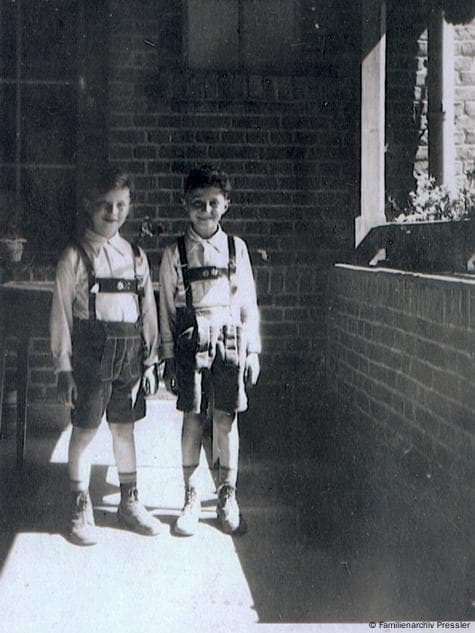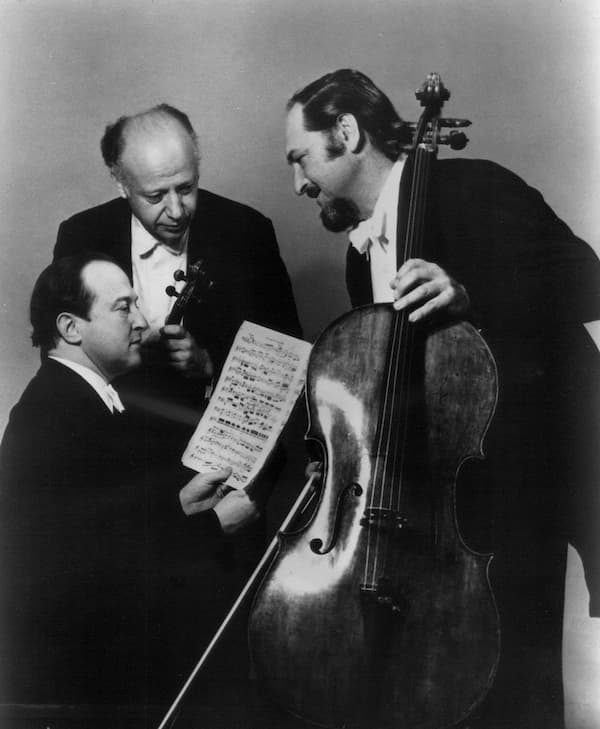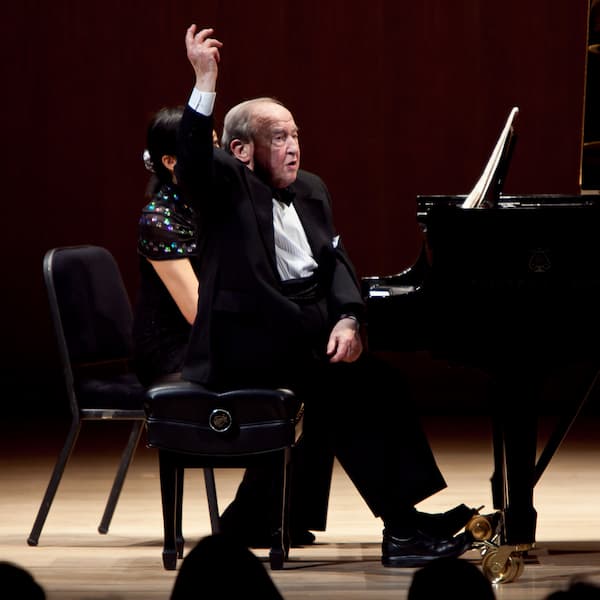Menahem Pressler is probably best known for his long tenure as the founder of the Beaux Arts Trio, an ensemble he established in 1955. Seeking and finding beauty and enjoyment in music was central to his philosophy. As both ensemble and solo pianist, “Pressler cultivated a style of extreme sensitivity and fastidiousness, with immensely subtle phrasing, articulation and voicing all serving to communicate his joy in making music to as wide an audience as possible.” In addition to recording nearly the entire piano chamber repertoire with the Beaux Arts Trio on the Philips label, Menahem Pressler has compiled over thirty solo recordings, ranging from the works of Bach to Ben Haim.
Menahem Pressler Plays Debussy’s Clair de lune
Magdeburg

Menahem Pressler © Julien Mignot
Max Jakob Pressler was born on 16 December 1923 in Magdeburg. His parents, Moritz and Judith Pressler, owned a clothing store in the city, and Menahem remembered that “the strongest memory growing up was that there was always love.” The family was very religious and kept the Jewish holidays, and Max had a Bar Mitzvah. He recalls, “I had to learn to read and sing part of the Torah, and that took me at least six months.”
The family also loved music and enjoyed listening to records. According to Menahem, his father played the violin very badly, and at the age of six, he began violin lessons while his brother started piano lessons with Mr. Kitzl, a Lutheran church organist. While his brother was bored with the piano, Menahem learned his brother’s pieces by just having heard them during lessons. As such, he stopped his violin studies and began learning to play the piano.
Franz Schubert: Piano Sonata No. 21 in B-flat Major, D. 960 (Menahem Pressler, piano)
Mr. Kitzl

Max and Leo Pressler
Initially, Menahem was playing everything by ear, and he asked his teacher to play pieces for him that he could reproduce. Kitzl eventually taught him to read music, and he continued to teach him even at the time when Germans were not supposed to associate with Jews. Menahem remembers “Kristallnacht,” the night of broken glass in 1938 when thugs throughout Germany and Austria destroyed and looted Jewish-owned businesses, including his parent’s store.
Menahem recalled the great courage of Mr. Kitzl as he would regularly come to the house to teach him. “I do remember the great, great, great kindness of Mr. Kitzl,” and he recalls that he learned Bach’s Prelude and Fugues, a Beethoven sonata, some Chopin works, and a Mozart concerto. As quoted in William Paul Brown’s wonderful biography, “Menahem was considered special in his family because he was playing music. And being successful quite early, they all tried to help. If I had a recital, they all publicised it.”
Menahem Pressler Plays Chopin’s Nocturne in C-sharp minor, Op. posth.
Into Exile

As the political situation hopelessly deteriorated, everybody was hoping that things would improve. Moritz Pressler almost waited too long, but in 1939, he applied for a tourist visa to visit Trieste with his family. It was a matter of luck that they actually made it, as “the German border police let them through, even though they didn’t have to.” Menahem was 15 at the time, and Mr. Kitzl kept forwarding him scores to Trieste, including a copy of Debussy’s Reflets dans l’eau with all fingerings marked.
While in Trieste, Menahem continued his studies with Mr. Rossi, who gave him lessons free of charge. After a couple of months, the family applied for travel visas to Palestine, which were eventually granted. They travelled on a big ship, and Menahem played a recital for the captain’s table with a programme including Beethoven, Debussy, Brahms, and Chopin.
Wolfgang Amadeus Mozart: Piano Sonata No. 18 in D Major, K. 576 (Menahem Pressler, piano)
Tel Aviv

Menahem Pressler
Pressler entered the Tel Aviv Conservatory at the age of 16 and studied with Liahu Rudiakov, a student of Max Pauer and assistant to Alfred Cortot. Pressler stayed with Rudiakov for four years, and he performed end-of-terms recitals each year. During his studies with Rudiakov, he learned the Grieg Concerto for the Palestine Symphony Orchestra competition. Pressler won first prize and gained the opportunity to perform the Grieg Concerto with the orchestra.
As he recalled, “It was a fantastic experience, first of all, because I had won this prize, and secondly to play with the Symphony Orchestra… And I practised like a maniac, and all I remember was that I loved doing it. I felt, this is what I want to do. That’s how I want to spend my life.”
For more of the best in classical music, sign up for our E-Newsletter

The article says, “Pressler entered the Tel Aviv Conservatory at the age of 16” but if he was born in 1923 that means he started the Tel Aviv Conservatory in 1939. However the Tel Aviv Conservatory wasn’t founded until 1943 or later. I was trying to follow where Pressler got his amazing training.
Pressler likely began his studies with Leo Kestenberg shortly after arriving in Palestine in 1939. Kestenberg was deeply involved in establishing music education in Israel, and he served as the general manager of the Palestine Orchestra, later Israel Philharmonic Orchestra. Senior members of that orchestra initially established an informal educational setting that would later become the Israel Conservatory and Academy of Music (Tel Aviv Conservatory)